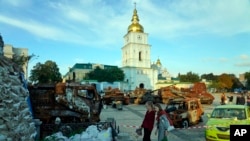Britain’s defense ministry says Ukrainian forces have continued to make significant gains in the Kharkiv region.
The agency’s intelligence report, posted Sunday on Twitter, said, “Russia has likely withdrawn units from the area, but fighting continues around the strategically important cities of Kupiansk and Izium.”
Ukrainian forces reported Saturday that they had gained control of Izyum and pushed Russian soldiers across the Oskil River. Russia’s Defense Ministry confirmed it had pulled its forces out of Izyum, claiming the move was planned.
Western military analysts said if the advances were confirmed, it would put the Ukrainians in control of a main railway that Moscow uses to supply thousands of troops in eastern Ukraine.
In other developments, a pro-Russia separatist leader was quoted as saying there also was fierce fighting between Russian and Ukrainian forces in the Donetsk region.
Denis Pushilin said the situation in the town of Lyman was “very difficult” and there was fighting in “a number of other localities,” particularly in the northern part of the region.
Military analysts say Russia is believed to be sending reinforcements to the area, where it plans to launch new attacks against Ukrainian-controlled sections of Donetsk.
Meanwhile, Moscow announced it was regrouping its forces in the eastern Kharkiv region of Ukraine.
“To achieve the goals of the special military operation to liberate Donbas, a decision was made to regroup Russian troops stationed in the Balakliya and Izyum regions, to bolster efforts along the Donetsk front,” Russia's Defense Ministry said in a statement.
The regrouping of Russian soldiers comes as residents in parts of the Kharkiv region had been advised to evacuate to Russia, according to the state-run news agency Tass. The area’s Russian-installed administrator, Vitaly Ganchev, reportedly said doing so would “save lives.”
The Ukrainian breakthrough near Kharkiv was the fastest advance reported by either side for months, and it is one of the biggest gains in the war since Russian forces abandoned a disastrous assault on the capital, Kyiv, in March.
Ukrainian President Volodymyr Zelenskyy said the country’s armed forces have liberated about 2,000 square kilometers of territory since a counteroffensive against Russia started earlier this month.
On the diplomatic front, German Foreign Minister Annalena Baerbock made a surprise visit to Kyiv on Saturday, pledging Berlin's unwavering support for Ukraine.
“I have traveled to Kyiv to show that they can continue to rely on us. That we will continue to stand by Ukraine for as long as necessary with deliveries of weapons, and with humanitarian and financial support,” Baerbock said in a statement.
Over the last weeks, Germany has sent howitzers, rocket launchers and anti-aircraft missiles to Ukraine. Heavier weapons such as anti-aircraft systems, rocket launchers mounted on pickup trucks and anti-drone equipment are also expected in a further military aid package worth more than $500 million.
Meanwhile, Britain’s defense ministry also said in its intelligence report Sunday that “Russia is pursuing a deliberate misinformation strategy as it seeks to deflect blame for food insecurity issues, discredit Ukraine and minimize opposition to its invasion.”
The ministry said that Russian President Vladimir Putin’s claim on Sept. 7 that only 60,000 tons of grain exported from Ukraine since August had been sent to developing countries, with the majority delivered to EU states, was false.
The ministry said, “According to UN figures, around 30% has been supplied to low and middle-income countries in Africa, the Middle East and Asia.”
Some information in this report came from Reuters, Agence France-Presse and The Associated Press.






